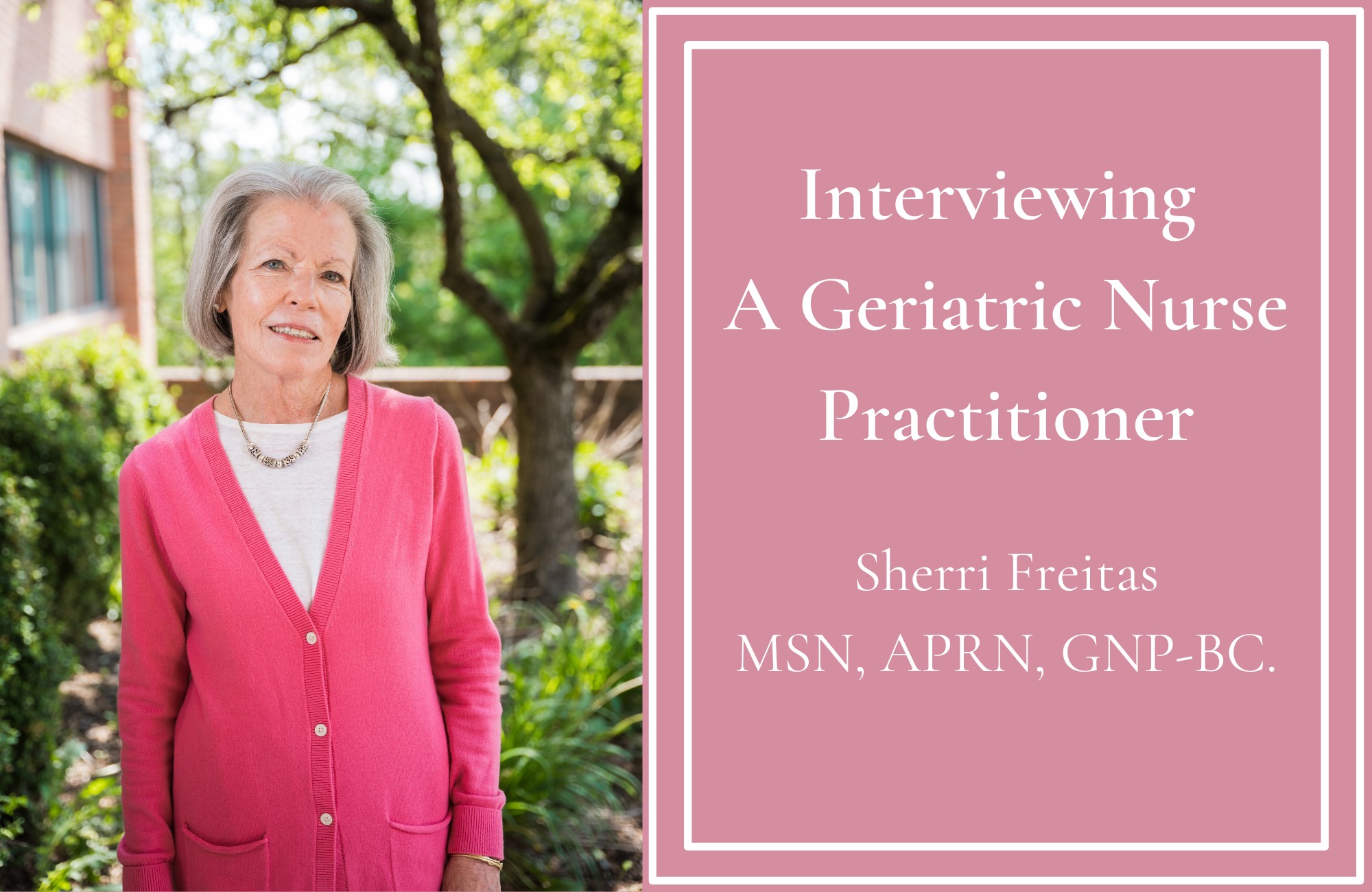The Big Picture: Nursing Home Questions ANSWERED by Geriatric Nurse Practitioner

The Big Picture: Nursing Home Questions ANSWERED by Geriatric Nurse Practitioner
When we train for a profession, we usually seek out a combination of targeted education and real-life experience. In some cases, we’ll be fortunate enough to call a colleague a true mentor– someone who significantly shaped our development and ignited a curiosity and commitment to a particular field.
For me, that person is Sherri Freitas, MSN, APRN, GNP-BC.
Late last month, we sat together for a conversation focused on 4 key topics:
- Why do people choose to work in long-term care?
- How do we support families to move through this process with greater ease?
- The importance of building trust: residents, families, nursing home operators.
- Recognizing the range of emotions and expectations that come with a long-term care transition.
Below are highlights from our conversation.
1) There’s a misperception out there that the best nurses want to work in a hospital/ acute care setting. Early on in your career, you specialized in geriatrics and then worked a significant portion of your career in long term care. Can you tell us about why you chose this specialty and what made it last?
The true answer is that I did not choose this specialty, it chose me.
Let me explain.
I was a young nurse working in a hospital in the Cardiac Intensive Care Unit. I loved it there but became acquainted with 2 nurse practitioners that kept encouraging me to apply to the program they had graduated from in Manhattan. Truth be told, I don’t think I was even initially aware that it was designed with a specialty in geriatrics. I just knew I was a young nurse who loved the idea of spending time in Manhattan.
I must admit that I had never entertained the idea of working specifically in geriatrics and was probably one of those nurses who thought you only went to work in a nursing home when you were ready to retire. The program I attended made me appreciate just how specialized the practice of geriatrics is, and how little acknowledgement there is the medical world, that the care of older adults requires a knowledge base specific to geriatrics and the unique needs of this population. By the time I completed the program, I was hooked.
Since the time I started as a nurse practitioner, my love of geriatrics has grown to a complete commitment to the field. So often, medical and non-medical people have said to me: “I don’t know how you do it. It must be so sad”. I say, it’s not sad, it is tremendously rewarding, professionally and personally. In what other practice do you get to listen to life stories, the sad ones, the happy ones, and everything in between? These patients are survivors, they have seen and done things in their lives that I couldn’t even imagine. But they share their stories with me. How fortunate I am.
This is a population with many health problems, their care is complex and very much focused on symptom management rather than cure. It’s greatly fulfilling to be a part of helping a patient live a more comfortable life with less disease burden. I know, and the patient knows, that the disease is not going away, but seeing them smile, or be able take part in activities with less stress, has made me eager to continue my work the next day.
I have found that my career in geriatrics has made me part of a larger family. In so many other fields, the interaction with patient, families, and loved ones is time limited and distanced. Not in geriatrics. I have known many of my patients and their significant others for long periods of time, often years. I am so grateful for that longevity. Especially when end of life nears, I hope given that continuity, I can be a source of comfort as I care for them in their final months, days, hours. That is a privilege.
To go back for a minute to other nurses who think the best nurses work in hospitals. I say, the best nurses need to stop making assumptions. Practice in a nursing home is a more independent practice than in a hospital setting. Nurses fully utilize their scope of knowledge, experience, and communication skills. Think about hospital practice, physicians have a strong presence and drive the train. In nursing homes, nurses and physicians drive the train together. It is the nurse that is at the bedside, not the physician.
So, what made my practice in geriatrics last? The patients.
2) The goal of the Like Glinda blog is to inform, guide, and empower families to navigate the world of long term care. What are 3 tips you can give a family exploring nursing home placement for a loved one?
Tip #1: If the nursing home smells bad, get out! I’m not talking about a transient odor. I’m talking about a permeating smell of stale urine. To me, this is a clear sign that the resident care arena is lacking. Would you want to smell that 24/7?
Tip #2: Watch how the staff interact with residents. Is there business only communication or does staff walk down the hall and acknowledge residents as they pass: say good morning, how are you, do need anything? Residents are not widgets; they are people who deserve to be treated with dignity and respect. If it’s business only, keep exploring.
Tip #3: Don’t assume because Mom or Dad is very private or sits and watches TV all day that they will not be interested in “nursing home life”. So often, I have seen residents blossom in the nursing home setting. They are no longer isolated; they have others to talk to and share activities with. Nursing homes offer a LIFE, they are not the place to die, they are places that offers life in a manner that the resident can succeed. The supports are there, the opportunity is there.
3) It’s so important for nursing home operators to develop relationships with residents and their families based on mutual goals, trust, and transparency. As a clinician, can you describe a time when this was challenging for you and how you eventually succeeded in building trust with a family?
YES, families can be challenging. For a variety of different reasons.
I think in the nursing home setting, clinicians also bear the burden of misconceptions about working in a nursing home. Too often I have felt looked down upon as a clinician because of my practice setting, making it even more challenging to earn the respect and trust of families and patients alike.
I remember one case that has stayed with me through my long career. A resident was admitted from a long hospital stay. She was very depleted, quite elderly, and her daughter was distraught. She was very close to her mother and very upset at her condition and that she was now in a nursing home. On one of my first visits to her, the resident complained of severe pain in her head. The daughter went on to say that her mother had been complaining about pain during her hospital stay but they were unable to find the source. Did I x-ray her? Did I do a CT scan of her head? No. I asked the resident exactly where the pain was in her head. She pointed to the right side. Then I looked, with my eyes. She had a terrible case of shingles; her scalp was covered with dried blood and vesicles. Her hair was badly matted. It seemed no one at the hospital looked at her head, only inside of it.
But that was not how I was able to build trust with the distressed daughter. I washed the resident’s hair. I asked the daughter permission to cut her mother’s hair, I started her on medication to treat the severe pain of shingles. I saw her mother as a person, Iistened to her, I stayed at the bedside and did what I would have done for my own mother. That is how I built trust. I didn’t walk away and give orders for interventions to be done. I did it myself because I saw her as a person in pain, I respected her, and didn’t leave her.
4) Recognizing that a loved one needs long term care and then making the transition to a nursing home can be immensely stressful and worrisome for many families. What are some tips you can give families to help manage emotions and expectations during this transition?
This is a tough question.
Each family is different with their own life experiences, family dynamics, and perceptions. Not to mention, guilt plays a large role for many families. So often, families apologize that they can’t take care of their family member themselves, that their family member never wanted to be in a nursing home, that their home is not set up properly to provide a safe setting, or that they work.
Some tips I can share:
- Allow yourself to feel emotional and even grieve. Your loved one’s loss of independence and/or need for care is a loss. Take time to acknowledge it, work through it, and don’t forget to be kind to yourself.
- Try not to project the difficulty of this life transition onto others: the caregivers, hospitals, doctors, nurses, nursing homes. Nursing home placement is not usually brought on by the fault of someone or something. It is progression of disease and the burden of the disease. Too much energy and emotion go into anger, it’s exhausting and counterproductive.
- Take an active role in getting to know the staff and routines of the nursing home. They are not your enemy. They are caring for your loved one, get to know them and the facility.
- Talk about your family member to staff at every level. Help them know who your loved one is, their history, their preferences, how they find enjoyment. You know so much that will help staff take care of your loved one and know them as an individual.
- Talk about your expectations with staff. Be open but also be understanding when some of your expectations may not be realistic or cannot be achieved. In this case, ask for greater clarity so you can better understand the circumstances.
- If there is something that is particularly important to your loved one, ask for staff support, as needed, to keep it a part of their life. Some examples: if Mom always wore lipstick, ask that it be applied daily; Dad always loved watching the Yankees, please turn the games on for him, etc.
- Understand that nursing homes are not generally able to provide 1:1 care. While we would all wish that it was possible, it is not. Same as hospitals.
- See the nursing home as your loved one’s home. Just the same as when they were in the community, they will make choices, they will have preferences. Nursing home staff cannot make a resident do something if they make the choice not to.
- Participate in activities along with your loved one as you are able. You might be surprised! Come into their new home and help them adjust to the new environment.


Leave a Reply